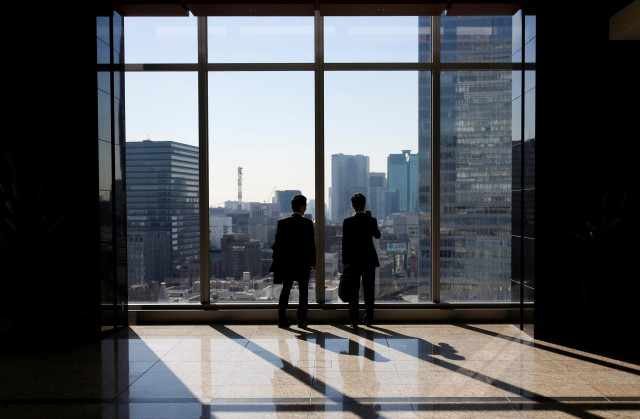Who are businesses accountable to?
Private entities should only be answerable to shareholders

Businessmen are seen inside a high-rise office building. PHOTO: REUTERS
I would have happily agreed with a different statement: each business should give back to the society or community in which they operate- something like Corporate Social Responsibility, which a vast number of businesses, big or small, practice today. However, to declare that a private firm, no matter how large it may become, should become ‘answerable and accountable’ to the society is against the principles of economic freedom.
Privately owned and privately-run business firms are legally answerable to their investors, boards and shareholders only.
Fishing community expresses concerns over corporate intrusion
The biggest social responsibility of a business, as Milton Friedman famously said once, is to earn profits. While many of us will be incensed over this statement, earning profits is no mean task. Imagine a country like Pakistan, where at least as per the official accounts of the World Bank, doing business is becoming difficult over years. Not only that the energy costs are rising (despite achieving a surplus of electricity generation), but no reforms in the areas of taxation are in sight. If you are a big business in Pakistan, it is likely that you will have to face arbitrariness of the government very often. If you are a small business, then you are likely to be confronted with an archaic system of inspections. This is in addition to generic uncertainties one faces being in a market.
I often give example of a restaurant, whether it is located on the posh location of M.M. Alam Road in Lahore or is run from a home-based kitchen to serve limited customers. If you are in the food business, you purchase your raw food ingredients on daily basis. The prices of raw food, including fruits, vegetables and meat change literally every day. Yet a restaurant or a food business owner does not change the price every day. In fact, the prices do not change over a long period. Economists got a name for this phenomenon - sticky prices.
Each business, big or small, also creates jobs. The job creation is itself a social phenomenon. It usually can make or break governments, and governments take pride in jobs created during their tenure. This does not suggest that they claim to create jobs themselves. They refer to the economic conditions which are conducive for job creation. I know that Pakistan’s largest engineering services company has more than 30,000 permanent staff on their payroll.
I also know a family member who runs a small food business, who only employs one person. To me, both businesses are morally doing a great social service - creating jobs which would not have existed without them.
UBL commits to water sustainability
No business can survive without the guarantee of ownership and any attempt to take even a part of this ownership is a theft. Anarcho-capitalists call even taxation a theft, but I do not buy this. Taxes are paid in return of services which a government provides. Just like a business owner pays for the services rendered by its employees, vendors and suppliers, it also pays the government.
Obviously, the choice is rather limited in the case of government as supplier. However, in the case of security, the foremost service for which the government is paid money, we already see choices.
Indeed, as we know, that the government has standing orders throughout Pakistan that all business owners, with above a threshold level of sales, are liable to provide for their own security. In fact, not to provide and pay for your own services - privately is actually an offense, and police can come to you and enforce you to hire private security contractors. This situation is bizarre, because other services like education and health are rather easy to access, even in absence of a government.
To do business in such a situation, and to earn profits, is no more an act of pure self-interest. Businesses are not accountable to the society - they are only accountable to their investors. Their survival and growth against all odds is the key to economic growth, social mobility and economic security. Thus, their biggest social responsibility is to make more profits.
The writer is the founder of PRIME Institute, an independent think tank based in Islamabad. Currently, he is associated with the Institute for Democracy and Economic Affairs (IDEAS) Malaysia
Published in The Express Tribune, December 11th, 2017.
Like Business on Facebook, follow @TribuneBiz on Twitter to stay informed and join in the conversation.


















COMMENTS
Comments are moderated and generally will be posted if they are on-topic and not abusive.
For more information, please see our Comments FAQ